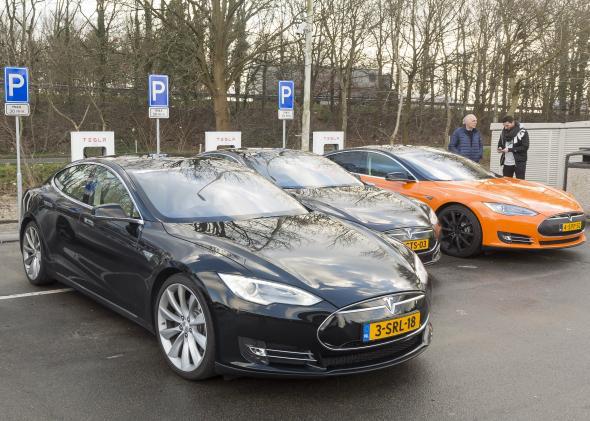Here’s a news flash, courtesy of tech blog the Verge: “Electric cars won’t save the planet.”
The argument, based on a policy analysis from a civil engineering professor at North Carolina State University, hinges on two points.
First, passenger vehicles account for only about 20 percent of U.S. emissions today. So even if they all ran on fairy dust, we’d still be polluting the air in plenty of other ways. And second, electric cars don’t run on fairy dust: Most of them run on power from the U.S. electricity grid, a lot of which comes from burning coal and natural gas (for now, anyway).
Both of these things are true, and it’s also true that electric cars on their own won’t save the planet. True, but trivial—and, all in all, a lazy and counterproductive thing to say. Of course electric cars on their own won’t save the planet. Who on Earth would disagree with that? At the risk of belaboring the point, here is a brief partial list off the top of my head of other things that won’t save the planet:
- Planting trees
- Recycling
- Ending slavery
- Curing cancer
Does that mean we shouldn’t try to do them? Obviously not. Yet a mantra like “electric cars won’t save the planet” is sure to be used by defenders of the status quo to argue that we should all keep driving gas-guzzlers.
Besides, the headlines don’t match what the study actually says. The media reports make it seem like the researchers found that U.S. emissions won’t drop significantly even if 42 percent of Americans are driving electric cars by 2050. But the study wasn’t looking at the direct emissions impacts of electric vehicles. It was looking at the overall U.S. emissions picture under a set of complex scenarios involving different levels of adoption of electric cars.
“It’s not that there’s no emissions benefit from electric drive vehicles,” the paper’s author, Joseph DeCarolis, told me in a phone interview. “It’s that there’s all this other stuff going on in this larger energy system that effects overall emissions.”
What he found is that the most likely scenario for high electric-vehicle adoption—up to 42 percent of all passenger vehicles by 2050—involves the government passing a law that places a national cap on carbon emissions. That seems highly unlikely to happen anytime soon, but it’s an interesting thought experiment, at least.
Now, you’d think we’d be much better off if 42 percent of Americans were driving electric cars—especially given the likelihood we’ll also be moving toward cleaner technologies for producing energy. And, all else equal, we would, as I’ve explained at length in the past. But if you read closely, the paper assumes that, under a carbon cap, the nation will pollute exactly to the limit of the cap no matter what specific technologies are adopted. Under this theory, all the emissions saved by switching to electric vehicles would simply create more room under the cap for people to pollute in other ways, like burning more coal. In that case, the study argues that electric vehicles would technically be lowering the cost of carbon rather than actually leading to a reduction in overall emissions.
It’s an interesting way of looking at the situation. But it would be bizarre to conclude from this that electric vehicles aren’t part of the solution—or that they “won’t save the planet.” After all, the same logic could be used to show that just about any technology will have little impact on overall emissions. What DeCarolis is getting at is that, if you really want to reduce overall U.S. emissions, a carbon cap is a more direct way to do that than subsidizing specific technologies.
I think almost every knowledgeable person in the environmental-policy field would agree with that. The problem is that environmental policy wonks don’t run Congress, and Republicans have shown no signs that they’d ever allow a carbon cap. That has left the Obama administration to try to find other ways to fight climate change, ranging from subsidies for solar power and electric cars to EPA rules limiting carbon emissions from power plants. What the North Carolina State paper doesn’t tell us is how much electric vehicles might be of help in a scenario where we don’t pass a carbon cap but do continue to phase out dirty coal power plants and move toward renewable sources of electricity, like solar. To me, that seems the more likely scenario.
I asked DeCarolis if he thought electric vehicles might play a more substantial role in reducing emissions in a scenario like that. He said it sounded plausible and that he might at some point do a follow-up study along those lines.
Then I asked him if it was fair to conclude from his study that electric vehicles aren’t all that good for the environment after all. His response: “My intention was never to conclude that all this EV stuff is a bunch of hogwash. No, no, no, no, no.”
The full paper is here.
Future Tense is a partnership of Slate, New America, and Arizona State University.
Previously in Slate:
